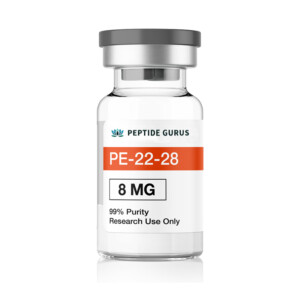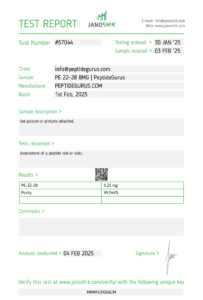The exploration of peptides in scientific research has gained significant traction, particularly in the realm of neurogenesis and synaptogenesis. Among these peptides, thePE-22-28 peptidehas emerged as a promising candidate due to its potential effects on the brain’s ability to generate new neurons and form synaptic connections. This article delves into the multifaceted effects of the PE-22-28 peptide on neurogenesis and synaptogenesis, providing insights into how it may alter cognitive functions and neural plasticity. Through the lens of PeptideGurus’ commitment to quality and the latest FDA guidelines, we explore the potential applications and benefits of this peptide in both research and therapeutic contexts.
The PE-22-28 peptide is a fragment derived from a larger peptide chain, specifically engineered to enhance its efficacy in promoting neural growth and connectivity. Its molecular structure allows it to interact with specific receptors in the brain, thereby stimulating the pathways involved in neurogenesis and synaptogenesis. Research has indicated that the PE-22-28 peptide can significantly influence the proliferation of neural stem cells, which are crucial for the formation of new neurons. This process is vital for maintaining cognitive health and function, particularly as the brain ages or undergoes stress-related changes.
Neurogenesis refers to the process by which new neurons are formed in the brain, a phenomenon that continues throughout life but diminishes with age. The PE-22-28 peptide has been shown to enhance this process by activating specific signaling pathways that promote the survival and differentiation of neural progenitor cells. This is particularly relevant in the context of neurodegenerative diseases, where the loss of neurons leads to cognitive decline. By fostering the generation of new neurons, the PE-22-28 peptide holds promise as a potential therapeutic agent for conditions such as Alzheimer’s disease and other forms of dementia.

Synaptogenesis, on the other hand, involves the formation of synapses between neurons, which are critical for communication within the brain. The PE-22-28 peptide has been observed to enhance synaptic plasticity, a key factor in learning and memory. By promoting the formation and strengthening of synaptic connections, this peptide could improve cognitive functions and aid in the recovery of brain injuries. The ability to modulate synaptic plasticity makes the PE-22-28 peptide a valuable tool in both research and clinical settings.
At PeptideGurus, we are committed to providing high-quality research peptides, including the PE-22-28 peptide, to support scientific advancements. Our partnerships with WHO/GMP and ISO 9001:2008 certified manufacturers ensure that our products meet the highest standards of purity and efficacy. This dedication to quality is essential for researchers who rely on accurate and reliable results in their studies of neurogenesis and synaptogenesis.
The FDA’s latest guidelines emphasize the importance of rigorous testing and quality assurance in the production of research peptides. At PeptideGurus, we adhere to these guidelines by collaborating with JANOSHIK LAB, a leader in peptide testing. Their expertise in HPLC, GCMS, and LCMS testing ensures that each batch of PE-22-28 peptide is thoroughly analyzed for purity and potency, providing researchers with confidence in their experimental outcomes.
In addition to its role in neurogenesis and synaptogenesis, the PE-22-28 peptide may also have implications for mood regulation and stress resilience. Studies suggest that enhancing neurogenesis can lead to improved mood and reduced symptoms of anxiety and depression. By promoting the growth of new neurons and synaptic connections, the PE-22-28 peptide could offer a novel approach to treating mood disorders, complementing existing therapies.
The potential applications of the PE-22-28 peptide extend beyond neurological health. Its ability to promote cellular growth and repair suggests that it could be beneficial in other areas of research, such as tissue regeneration and recovery from injury. This versatility underscores the peptide’s value as a research tool, offering insights into a wide range of biological processes and potential therapeutic interventions.

Understanding the mechanisms by which the PE-22-28 peptide exerts its effects is crucial for harnessing its full potential. Ongoing research aims to elucidate the specific pathways involved in its action, providing a clearer picture of how it can be used to enhance brain function and repair. As our knowledge of these mechanisms grows, so too does the potential for developing targeted treatments for neurological and cognitive disorders.
The role of peptides in scientific research is continually evolving, with new discoveries highlighting their potential to transform our understanding of health and disease. The PE-22-28 peptide represents a significant advancement in this field, offering a promising avenue for exploring the complexities of brain function and repair. By investing in high-quality research peptides, PeptideGurus is at the forefront of this exciting frontier, supporting scientists in their quest to unlock the mysteries of the brain.
In conclusion, the PE-22-28 peptide offers a wealth of possibilities for advancing our understanding of neurogenesis and synaptogenesis. Its ability to promote neural growth and connectivity positions it as a valuable asset in both research and clinical applications. As we continue to explore its effects and refine our methodologies, the potential for breakthroughs in treating neurological disorders becomes increasingly attainable.
For researchers and clinicians alike, the PE-22-28 peptide represents a unique tool for probing the intricacies of brain function. By fostering new neuron growth and enhancing synaptic connections, it opens up new pathways for understanding and potentially treating a range of cognitive and neurological conditions. The commitment of PeptideGurus to quality and innovation ensures that our clients have access to the most advanced and reliable research peptides available.
As we look to the future, the role of peptides like PE-22-28 in scientific research will undoubtedly expand, offering new insights into the brain’s capacity for regeneration and repair. The ongoing collaboration between researchers, manufacturers, and testing facilities will be crucial in advancing our understanding and application of these powerful compounds. At PeptideGurus, we remain dedicated to supporting this progress through our unwavering commitment to quality and excellence.
요약하면PE-22-28 peptideholds significant promise for enhancing neurogenesis and synaptogenesis, with potential applications in treating a variety of neurological conditions. By adhering to the highest standards of quality and following the latest FDA guidelines, PeptideGurus is proud to offer this cutting-edge peptide to the scientific community, empowering researchers to make meaningful strides in understanding and improving brain health.
Peptidegurus는 미국에서 만든 연구 펩티드의 주요 공급 업체로 경쟁력있는 가격으로 최고 품질의 제품을 제공합니다. 우수성 및 고객 서비스에 중점을 두어 글로벌 배송으로 안전하고 편리한 주문 프로세스를 보장합니다.
CONTACT